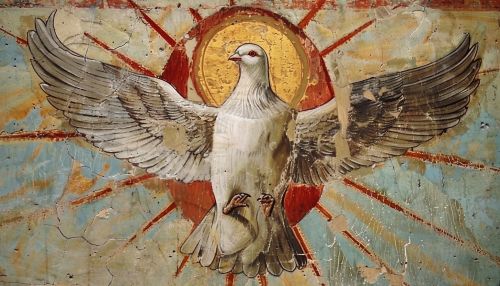Pneumatology: Difference between revisions
(Created page with "== Overview == Pneumatology is the branch of Christian theology that focuses on the study of the Holy Spirit. The term originates from the Greek word "pneuma," which translates to "wind," "breath," or "spirit." Pneumatology includes study of the person of the Holy Spirit, and the works of the Holy Spirit. This branch of theology is significant in Christianity, as it is integral to understanding the nature of God, the workings of the Church, and the...") |
No edit summary |
||
| (One intermediate revision by the same user not shown) | |||
| Line 2: | Line 2: | ||
Pneumatology is the branch of [[Christian Theology|Christian theology]] that focuses on the study of the Holy Spirit. The term originates from the Greek word "pneuma," which translates to "wind," "breath," or "spirit." Pneumatology includes study of the person of the Holy Spirit, and the works of the Holy Spirit. This branch of theology is significant in Christianity, as it is integral to understanding the nature of God, the workings of the Church, and the spiritual life of the believer. | Pneumatology is the branch of [[Christian Theology|Christian theology]] that focuses on the study of the Holy Spirit. The term originates from the Greek word "pneuma," which translates to "wind," "breath," or "spirit." Pneumatology includes study of the person of the Holy Spirit, and the works of the Holy Spirit. This branch of theology is significant in Christianity, as it is integral to understanding the nature of God, the workings of the Church, and the spiritual life of the believer. | ||
[[Image:Detail-78923.jpg|thumb|center|A depiction of a dove, often used as a symbol of the Holy Spirit in Christian art.|class=only_on_mobile]] | |||
[[Image:Detail-78924.jpg|thumb|center|A depiction of a dove, often used as a symbol of the Holy Spirit in Christian art.|class=only_on_desktop]] | |||
== Historical Development == | == Historical Development == | ||
Latest revision as of 03:51, 16 May 2024
Overview
Pneumatology is the branch of Christian theology that focuses on the study of the Holy Spirit. The term originates from the Greek word "pneuma," which translates to "wind," "breath," or "spirit." Pneumatology includes study of the person of the Holy Spirit, and the works of the Holy Spirit. This branch of theology is significant in Christianity, as it is integral to understanding the nature of God, the workings of the Church, and the spiritual life of the believer.


Historical Development
The understanding and interpretation of the Holy Spirit have evolved over the centuries, with significant developments occurring during the early Christian period, the Middle Ages, the Protestant Reformation, and the modern era.
Early Christianity
In the early Christian Church, the Holy Spirit was understood as an integral part of the Trinity, which includes God the Father, God the Son, and God the Holy Spirit. The Holy Spirit was seen as the active presence of God in the world, and was associated with the life-giving power of God.
Middle Ages
During the Middle Ages, theologians such as Thomas Aquinas further developed the understanding of the Holy Spirit. Aquinas, in his work Summa Theologica, discussed the Holy Spirit in relation to the love between the Father and the Son.
Protestant Reformation
The Protestant Reformation, led by figures such as Martin Luther and John Calvin, brought about a renewed focus on the Holy Spirit. Luther emphasized the role of the Holy Spirit in justification, while Calvin highlighted the Spirit's work in uniting believers to Christ.
Modern Era
In the modern era, the study of the Holy Spirit has become a central focus of many Christian denominations, particularly in Pentecostalism and Charismatic movements. These movements emphasize the gifts of the Spirit, including speaking in tongues, prophecy, and healing.
Theological Perspectives
Different Christian traditions have varying perspectives on the Holy Spirit, reflecting their unique theological emphases.
Eastern Orthodoxy
In Eastern Orthodoxy, the Holy Spirit is seen as proceeding from the Father alone, a view articulated in the Filioque controversy. The Spirit is also associated with the life-giving and sanctifying work of God.
Roman Catholicism
In Roman Catholicism, the Holy Spirit is understood as proceeding from both the Father and the Son. The Spirit is seen as the love between the Father and the Son, and is associated with the Church's sacramental life.
Protestantism
In Protestant theology, the Holy Spirit is often associated with the work of salvation and sanctification. The Spirit is seen as the one who convicts individuals of sin, brings them to faith in Christ, and enables them to live a Christian life.
Pentecostal and Charismatic Movements
In Pentecostal and Charismatic movements, the Holy Spirit is emphasized as the giver of spiritual gifts for the edification of the Church. These gifts include speaking in tongues, prophecy, and healing.
Role in Christian Life
The Holy Spirit plays a crucial role in the life of a Christian believer. The Spirit is seen as the one who convicts of sin, leads to conversion, indwells the believer, guides into all truth, and empowers for service.
